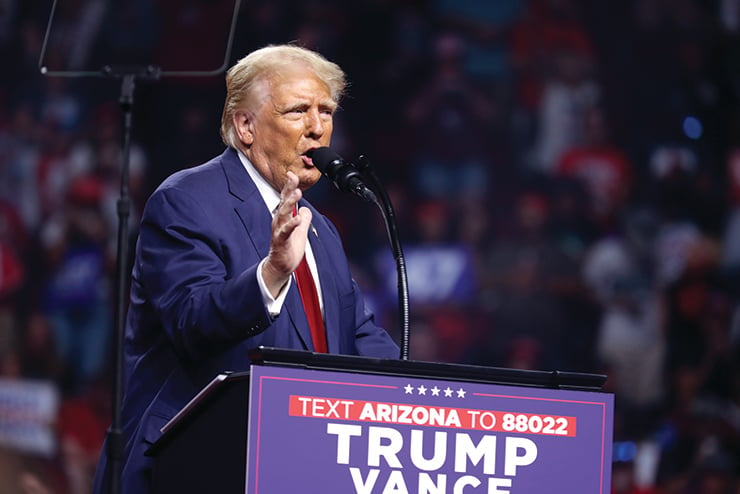The morning after Americans elected as president a man regularly labeled a “Nazi,” a “fascist,” a “racist,” a “mortal threat to American democracy,” and the like by mainstream news outlets—even after he was nearly killed by one would-be assassin and seriously threatened by another—I received a succinct summary of what had just happened from a long- time friend whose political views are thoughtful, considered, and often surprising: “This election restored my faith in the intelligence of the average American voter.”
Trump’s victory was broad, deep, and impressive. Despite the continuous attacks against him, Trump increased his percentage of the vote virtually everywhere and among virtually every demographic group. Trump received 2 million more popular votes than Kamala Harris and 312 electoral votes to her 226. He won all the states he was expected to win and every battleground state, increased the GOP share of the vote in the remaining states, and carried enough Republican Senate candidates over the finish line to win control of that chamber. The heart of Trump’s support remained white Christians, but Trump won the election by bringing in more voters of every race, creed, class, and condition.
J. D. Vance turned out to be even more of a boon to Trump than I thought he might be. Vance’s intelligence, diligence, self-discipline, and energy were on regular display throughout the campaign, and they could not be hidden from voters despite an intense, albeit bizarre, media attempt to brand as “weird” a Marine vet who rose from poverty and chaos to graduate from Yale Law School, and who is also a husband, father, and churchgoer. Vance’s mere presence on the ticket reminded voters that America need not be governed by geriatrics, and showed that Trump had a plan to shape American politics for years to come. So thoroughly did Vance dominate his debate with his Democratic opponent, Minnesota governor Tim Walz, that “Saturday Night Live” took a break from Trump-bashing and featured Jim Gaffigan’s devastating imitation of the hapless Minnesotan.
Vance also continued to articulate the overarching difference between the Trump-Vance view of the world and the Harris-Walz view of the world. As Vance noted in his acceptance speech at the Republican Convention, America is not an “idea” but our “homeland.”
“People will not fight for abstractions, but they will fight for their home,” Vance said. “And if this movement of ours is going to succeed, and if this country is going to thrive, our leaders have to remember that America is a nation, and its citizens deserve leaders who put its interests first.”
The majority of Americans—including legal immigrants—agreed with the ideas that Trump and Vance drew from their America First philosophy. They don’t want open borders. They don’t want our manufacturing sector outsourced to China. They are tired of endless foreign wars. And they are just as concerned about the pharmaceutical industry as RFK Jr., especially given the great rise in the number of Americans suffering horrible neurological disorders.
The Democrats had nothing to challenge this America First agenda. What the Democrats offered instead was an open celebration of baby-killing; the alternate religion of “diversity” that blames all problems on white men and, in most cases, white women, too; open borders forever; and acquiescence to the cabal of elites who runs America but disdains its past.
After all, someone was making important decisions after Biden’s mental capacity diminished his range of interests to consuming soft-serve ice cream. Certainly it wasn’t Kamala, who devoted her time to giggling on the campaign trail. Someone also decided Biden would not be the nominee and that Harris would, despite the millions who had voted for Biden in the Democratic primaries. We don’t know who is in this cabal because the media has no interest in finding out. That the cabal exists, though, is certain. Donald Trump has given Americans an opportunity to challenge the cabal and to save our country, or at least given us who love our heritage an opportunity to salvage its best parts.
The cabal’s pseudo-religion arose in the 1960s. Its tenets present a mortal threat to Western civilization, of which America has always been an integral part.
One of those who saw this danger at its rising was Sir Kenneth Clark, whose BBC miniseries Civilisation examined the ways in which Western civilization arose out of the wreckage of the Roman Empire. Clark stated that he could not define civilization abstractly but that he knew it when he saw it. As he spoke, his camera showed Notre Dame de Paris, which is now reopening in grand fashion after an amazing reconstruction.
President Trump was there, too. Maybe, just maybe, those who appreciate what the West created are regaining their voice. ◆

Leave a Reply